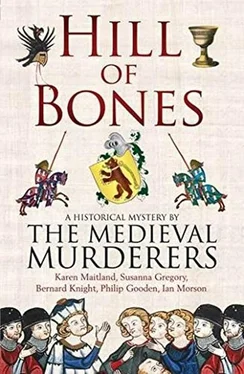He watched Pica sit suddenly and raise a hand to his head. It looked like the beginnings of a fever – and Walter knew, because that was what had happened after he had fed a similar substance to Reginald. Of course, Savaric did not know who had been responsible for that particular deed; for all this ambition, Savaric had loved his cousin dearly. Walter, though, had found the man’s piety irritating, and it had been deeply satisfying to poison him before he could be made Archbishop of Canterbury.
Walter did not wait to see Pica die, because a pouch had arrived that morning along with instructions that it was not to be opened until he had completed his duties. He was eager to know what it contained, because he could certainly hear the jingle of coins within. As Pica was already as good as dead, he fumbled with the seals, excitement making his fingers clumsy. He grinned his delight when several gold nobles spilled into his eager hands. There was also a letter.
He tore it open, and read the message within – Savaric thanking him for getting rid of a man who had been such a thorn in his side. Walter regarded it in alarm. Was the bishop mad to put such thoughts in writing? What if the pouch had fallen into the wrong hands? It would have sealed both their fates!
Then he became aware of raised voices and looked up to see that the people who had gathered around the dying Pica were staring at him. Pica raised a shaking hand and pointed. Immediately, three monks started to run towards him. Appalled, Walter tried to hide the letter, first slipping it up his sleeve, and then, in frantic desperation, stuffing it in his mouth.
It was no good. The monks forced him to spit it out, and their faces paled with shock when they read what was written. They grabbed his arms, so he could not escape, at which point, the coins dropped from his fingers. He tried to protest his innocence, but he had neglected to throw away the phial that had contained the poison, and they found it in his bag. That, with the letter and the gold, would be more than enough to convict him. Would it convict Savaric, too? Walter, full of frustrated spite, sincerely hoped so. But then he happened to glance at Pica, who still clung to the vestiges of life.
Pica was smiling. It was an unusual enough sight that Walter gaped. But then he understood. Clever Pica! He had guessed that he might not reach Rome alive, so he had staged his own revenge on the men he thought might kill him. Savaric had written no letter. Of course he had not – he was far too astute for such a blunder. It was Pica!
But would it succeed in destroying Savaric, or would the bishop’s denials be enough to let him keep the kingdom he had carved for himself in Bath and Glastonbury? Walter could have wept with pity for himself when he realised that he would never know.
Historical Note
There has been an abbey in Bath since Saxon times. Originally, an abbot was in charge, but this changed in 1098, when the then Bishop of Wells moved his seat there. The abbey became a cathedral priory, with a prior as its head. Hugh was prior from 1174; Prior Walter died in 1198; and Prior Robert stayed in office until being elected Abbot of Glastonbury in 1223.
In 1191, Savaric fitz Geldwin became Bishop of Bath, following the promotion of his cousin, Reginald fitz Jocelyn, to the Archbishopric of Canterbury. Reginald died en route to his installation, and his body was returned to Bath, where it was buried in the abbey church. He was popular, founding the Hospital of St John the Baptist (one of its early masters was named Adam), and several miracles were later said to have occurred at his tomb.
No such saintliness was attributed to Savaric, however. Greedy and ambitious, he contrived to have Hugh de Sully, Abbot of Glastonbury, appointed Bishop of Worcester, and then announced to Glastonbury’s astonished monks that he was their master now. Needless to say they objected, and immediately appealed against him to Richard I and the Pope. Unfortunately for them, both supported Savaric, although Richard later recanted, and claimed he had been coerced.
The Dean and Chapter of Wells were also outraged by Savaric’s high handedness in changing his title from ‘Bishop of Bath’ to ‘Bishop of Bath and Glastonbury’. Canons Ralph de Lechlade and Jocelin Trotman were the two representatives who travelled to Bath to make their objections known.
In 1198, the Pope died, Richard withdrew his support from Savaric, and the Glastonbury monks elected William Pica as abbot. Savaric promptly excommunicated Pica. Another twist in the tale occurred in 1199, when King Richard was succeeded by his brother John, who allowed Savaric to buy his support. Armed with John’s backing, Savaric invaded Glastonbury with a mob of henchmen, and forcibly enthroned himself. Several monks were injured in the resulting mêlée.
Outraged, Pica left for Rome. He died on the journey, and Glastonbury’s monks claimed that Savaric had had him poisoned. Glastonbury did not win its independence from Bath until 1219. Savaric weathered the accusations, and died a wealthy and successful man in 1205. He was succeeded as bishop by none other than Canon Trotman, who remained in post until 1242.
September 1204
The lay brother set the wooden tray on the floor at his feet and stretched himself, hands pressed against his aching back. He had been bending for the last ten minutes, polishing the brass feet of a lectern until he could see his face in the gleaming metal.
Eldred took an almost proprietorial pride in his part of the great abbey church and now gazed around fondly in the peaceful noon-time, glad to be alone while the priests, monks and deacons were eating in the refectory. He was a slight, fair man of thirty, with an open face and an inoffensive manner to match.
He had been tending the fabric of Bath’s cathedral for the past ten years and had graduated from being a lowly cleaner down in the nave, to being responsible for this upper part of the building, the most sanctified area of the choir, the presbytery and the sanctuary, the space that held the high altar.
Picking up his tray of cleaning cloths and beeswax polish, Eldred moved to the centre and genuflected towards the altar, a long table covered with a lace-edged linen cloth of spotless white, on which was a bronze cross and a pair of tall candlesticks. He crossed to the north side of the presbytery, the space between choir and sanctuary. As he went, he looked briefly down through the rows of choir stalls. Beyond them, he saw the carved rood screen that shielded the holiest area from the nave and the rude stares of the townsfolk, when they came to stand there for Sunday worship. There was still no sign of anyone returning from their midday meal, so Eldred decided to give a quick polish to the sacred vessels – his favourite task, as it allowed him to handle the most venerated objects in the abbey.
Padding across the tiled floor in his sandals, he went to the aumbry, a cupboard set in the thickness of the wall between the presbytery and the ambulatory, the corridor that ran around inside the east end of the church.
The two doors of the aumbry were of polished oak with brass corners, an ornate ivory cross set into each panel. They were closed by a large brass hasp and staple, with a padlock securing them. Eldred fumbled for the ring of keys that hung on a chain from the leather belt around his long brown robe. By touch alone, he chose one that he had handled virtually daily for the past four years and advanced on the lock.
It was then that warning bells began to ring inside his head. As he touched the lock to push the key into the hole, the hasp swung slackly back on its hinge, the staple from the other door coming away with it. Almost unwilling to believe his eyes, Eldred saw that the four long rivets that had held the staple to the oak were drooping from the brass plate, scraps of torn wood falling to the floor beneath. In a frenzy of concern, he pulled open both doors, still hoping that this was some explicable happening, like dry rot or woodworm – a foolish thought, but better than the obvious alternative.
Читать дальше












